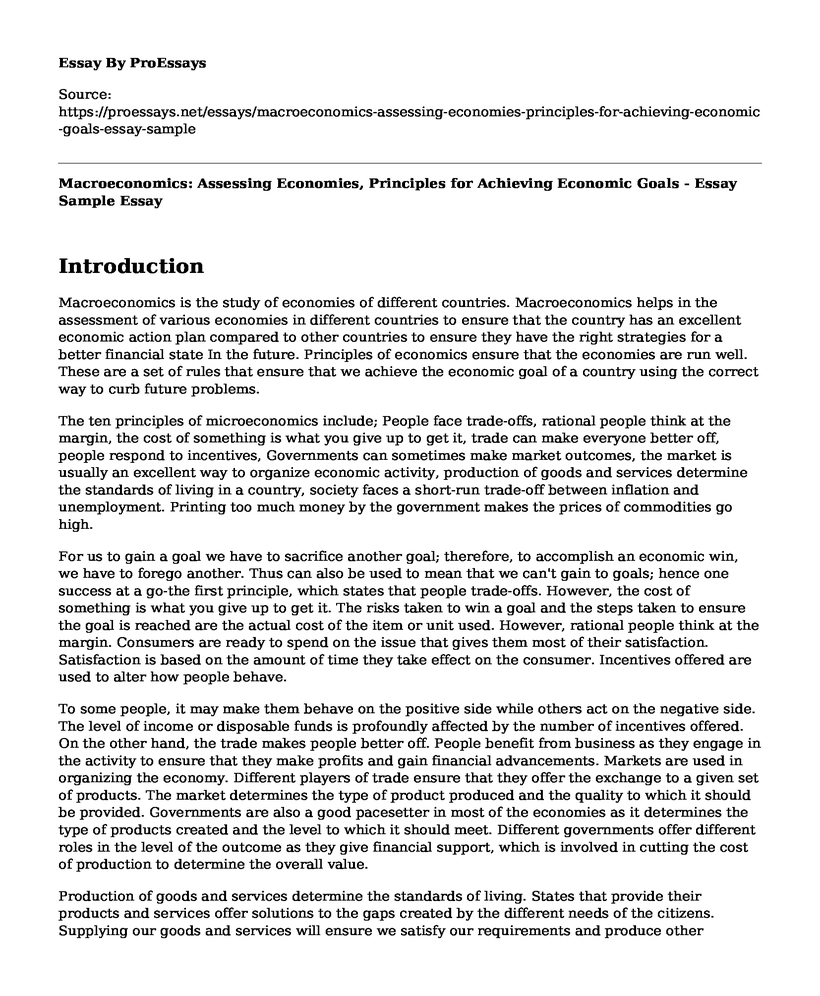Introduction
Macroeconomics is the study of economies of different countries. Macroeconomics helps in the assessment of various economies in different countries to ensure that the country has an excellent economic action plan compared to other countries to ensure they have the right strategies for a better financial state In the future. Principles of economics ensure that the economies are run well. These are a set of rules that ensure that we achieve the economic goal of a country using the correct way to curb future problems.
The ten principles of microeconomics include; People face trade-offs, rational people think at the margin, the cost of something is what you give up to get it, trade can make everyone better off, people respond to incentives, Governments can sometimes make market outcomes, the market is usually an excellent way to organize economic activity, production of goods and services determine the standards of living in a country, society faces a short-run trade-off between inflation and unemployment. Printing too much money by the government makes the prices of commodities go high.
For us to gain a goal we have to sacrifice another goal; therefore, to accomplish an economic win, we have to forego another. Thus can also be used to mean that we can't gain to goals; hence one success at a go-the first principle, which states that people trade-offs. However, the cost of something is what you give up to get it. The risks taken to win a goal and the steps taken to ensure the goal is reached are the actual cost of the item or unit used. However, rational people think at the margin. Consumers are ready to spend on the issue that gives them most of their satisfaction. Satisfaction is based on the amount of time they take effect on the consumer. Incentives offered are used to alter how people behave.
To some people, it may make them behave on the positive side while others act on the negative side. The level of income or disposable funds is profoundly affected by the number of incentives offered. On the other hand, the trade makes people better off. People benefit from business as they engage in the activity to ensure that they make profits and gain financial advancements. Markets are used in organizing the economy. Different players of trade ensure that they offer the exchange to a given set of products. The market determines the type of product produced and the quality to which it should be provided. Governments are also a good pacesetter in most of the economies as it determines the type of products created and the level to which it should meet. Different governments offer different roles in the level of the outcome as they give financial support, which is involved in cutting the cost of production to determine the overall value.
Production of goods and services determine the standards of living. States that provide their products and services offer solutions to the gaps created by the different needs of the citizens. Supplying our goods and services will ensure we satisfy our requirements and produce other products to cater to the needs of other countries, which will be used in international trade. International trade is crucial in giving financial freedom to most of the citizens in different countries; therefore, the ability to produce more goods provides the country with the ability to gain income from international trade. However, the government printing too much money makes the level of inflation rise, which causes the prices of commodities to lose value. Therefore, a country that prints too much money, such as Zimbabwe, is at risk of eventually having o place in international trade. Unemployment and inflation are inseparable. An increase in the level of inflation makes it hard for the economy to make financial progress as they don't have enough income to create jobs for the people. Therefore, an increase in inflation causes a rise in unemployment and vice versa.
Cite this page
Macroeconomics: Assessing Economies, Principles for Achieving Economic Goals - Essay Sample. (2023, Jun 21). Retrieved from https://proessays.net/essays/macroeconomics-assessing-economies-principles-for-achieving-economic-goals-essay-sample
If you are the original author of this essay and no longer wish to have it published on the ProEssays website, please click below to request its removal:
- Monetary Policy Discussions - Economics Essay Example
- Essay Example on Immigrants in US: Benefits & Impact on Labor Force
- Essay Example on Fashion Merchandising: Success Factors of the Global Market
- Essay Example on Frank Jones' Team: Job Analysis for Sleep Ti
- Essential Skills for Canadian Employees: Communication, Info Mgmt, Problem-Solving & More - Essay Sample
- Capitation Model: A Solution to Healthcare Finances Misuse - Essay Sample
- Workplace Discrimination - Free Report Sample







